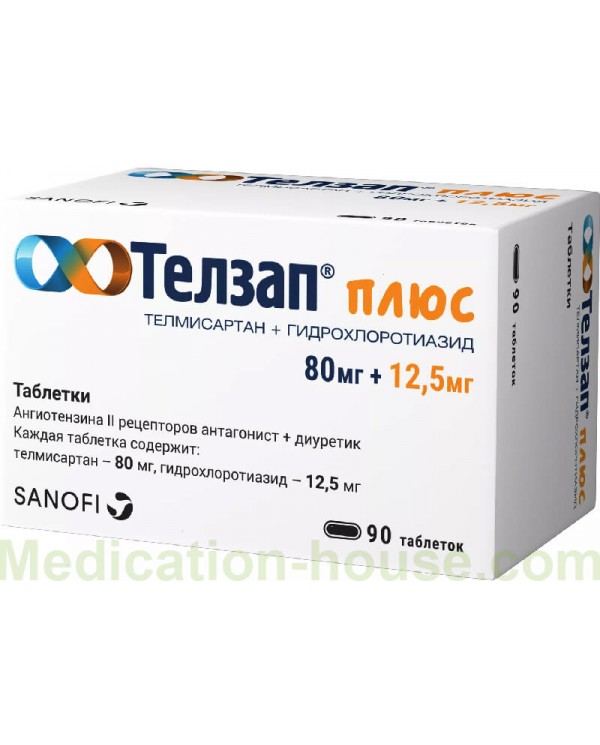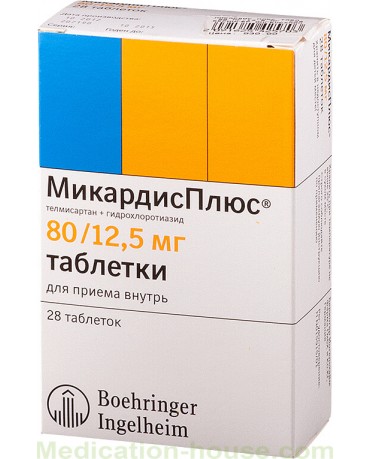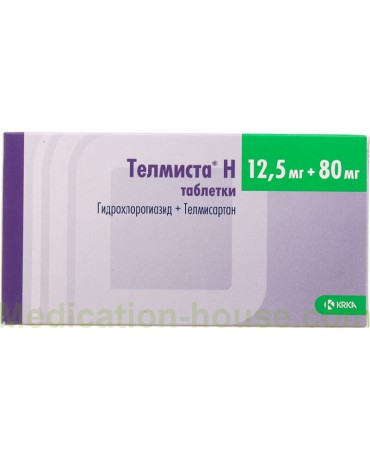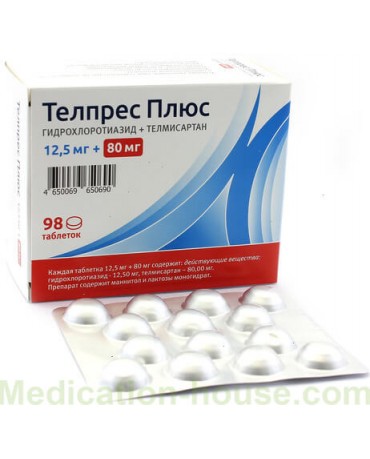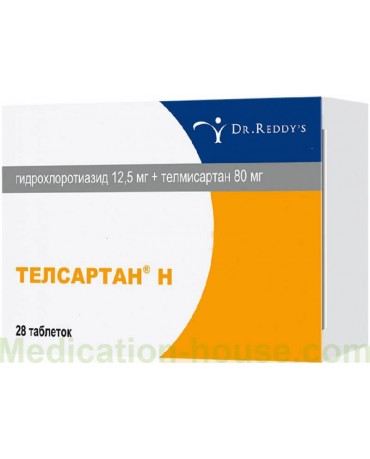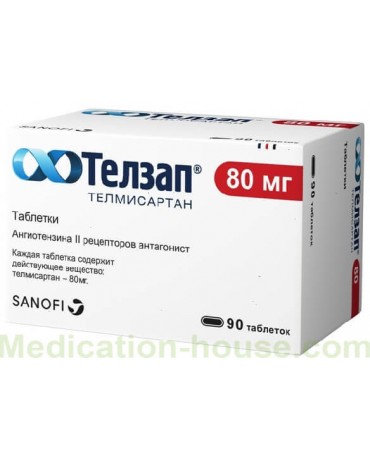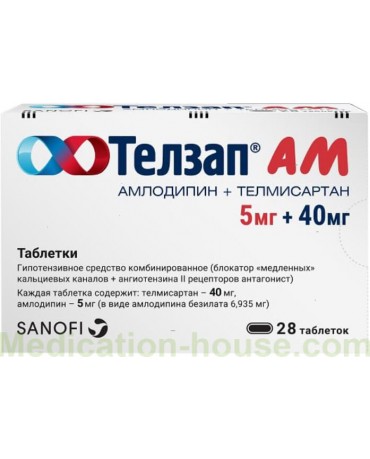User manual for Telzap Plus
To buy Telzap Plus just add it to your shopping cart
Telzap Plus is an antihypertensive combination drug.
Release form and composition
The drug is produced in the form of tablets: oblong, biconvex, from pale yellow to white, on one side with an engraving "41" - for a dosage of 40 / 12.5 mg, "81" - for a dosage of 80 / 12.5 mg or "82" - for a dosage of 80 / 25.5 mg (tablets 80 / 12.5 mg - 10 pcs. In a blister, in a cardboard box 3 or 9 blisters, 14 pcs. In a blister, in a cardboard box 1, 2, 4, 6 or 7 blisters; tablets 40 / 12.5 mg or 80/25 mg - 10 pcs. In a blister, 3 packs in a cardboard box; each pack also contains instructions for the use of Telzap Plus).
1 tablet contains:
active ingredients: telmisartan - 40/80/80 mg + hydrochlorothiazide - 12.5 / 12.5 / 25 mg, respectively;
auxiliary components: sodium hydroxide, sorbitol, magnesium stearate, povidone.
Pharmacodynamics
Telzap Plus is an antihypertensive combination drug, which includes an angiotensin II receptor antagonist (ARA II) - telmisartan and a thiazide diuretic - hydrochlorothiazide. Thanks to the combination of these active substances, Telzap Plus has a more pronounced antihypertensive effect, which makes it possible to lower blood pressure (BP) to a greater extent than when each component is used as a monotherapy drug.
When Telzap Plus is taken in therapeutic doses 1 time per day, a smooth and effective decrease in blood pressure is noted.
Telmisartan
Telmisartan belongs to the specific ARA II (subtype AT1), effective when taken orally. It is characterized by a high affinity for the AT1 subtype of angiotensin II receptors, with the help of which the action of angiotensin II is carried out. The substance displaces angiotensin II from the binding to the receptor, while not showing any agonist activity towards the AT1 receptor, selectively and long-term binds to the latter. Does not show affinity for other receptors, including AT2 and other, less studied AT receptors. The functional significance of these receptors, as well as the result of their potential increased activation of angiotensin II due to an increase in the level of the latter under the influence of telmisartan, has not been studied.
The active substance reduces the plasma concentration of aldosterone in the blood, suppresses renin, does not interfere with the functioning of ion channels, does not inhibit the angiotensin-converting enzyme (ACE) kininase II, which also destroys bradykinin, as a result of which it is possible to avoid disorders caused by the activity of the latter. Telmisartan at a daily dose of 80 mg in healthy volunteers almost completely suppresses the hypertensive effect of angiotensin II. This activity of the substance is observed for more than 24 hours (it lasts up to 48 hours).
The antihypertensive effect of telmisartan appears within the first 3 hours after oral administration. Telzap Plus demonstrates a therapeutic effect within 24 hours, including for 4 hours before taking the next dose, which is confirmed by the data of daily monitoring of blood pressure. This is also evidenced by measurements taken at the time of maximum effect and immediately before taking the next dose (for dosages of 40 and 80 mg of the substance, the ratio of the residual effect to the maximum exceeds 80%). The greatest decrease in blood pressure is observed 4–8 weeks after the start of therapy and persists for a long period of treatment.
In patients with arterial hypertension, telmisartan lowers both systolic and diastolic blood pressure, without affecting the heart rate (HR). In accordance with the results of clinical studies, the antihypertensive efficacy of the active substance is comparable to that of drugs of other classes, such as atenolol, amlodipine, hydrochlorothiazide, enalapril and lisinopril. If it is necessary to suddenly stop taking telmisartan, blood pressure gradually returns to its initial values without the development of withdrawal symptoms.
On the background of treatment with telmisartan, the appearance of dry cough was noted much less frequently than with the use of ACE inhibitors.
Hydrochlorothiazide
Hydrochlorothiazide is a thiazide diuretic that affects the reabsorption of electrolytes in the renal tubules, which leads to an increase in the excretion of sodium and chloride ions in approximately equal amounts. The diuretic effect of the substance provides a decrease in the volume of circulating blood (BCC), an increase in the activity of blood plasma renin, an increase in the production of aldosterone with a further increase in the level of bicarbonate and potassium in the urine, as well as a decrease in the plasma level of the latter in the blood.
Concomitant use with telmisartan leads to a decrease in potassium loss caused by this diuretic, presumably due to blockade of the renin-angiotensin system (RAAS). After oral administration of hydrochlorothiazide, increased diuresis is noted after 2 hours, and the maximum effect after 4 hours, the effect lasts for about 6-12 hours.
In the course of epidemiological studies, it was found that long-term treatment with hydrochlorothiazide reduces the risk of cardiovascular morbidity and mortality.
Pharmacokinetics
In healthy volunteers, the simultaneous use of telmisartan and hydrochlorothiazide does not affect the pharmacokinetics of each of these active components of Telzap Plus.
Telmisartan
After oral administration, telmisartan is rapidly absorbed from the gastrointestinal tract, the maximum concentration of the substance (Cmax) is reached after 0.5-1.5 hours. When the substance is taken at a dose of 40 and 160 mg, the absolute bioavailability is 42 and 58%, respectively. Concomitant food intake slightly reduces the bioavailability of the drug, a decrease in the area under the concentration-time curve (AUC) can range from 6% (dose 40 mg) to 19% (dose 160 mg), which does not lead to a decrease in the clinical efficacy of Telzap Plus. 3 hours after ingestion, the level of the substance in the blood plasma levels off, regardless of whether it was used with meals or on an empty stomach.
After oral administration, the pharmacokinetics of telmisartan is not linear; after repeated consumption, no significant cumulation in blood plasma was detected. The substance binds to plasma proteins, mainly albumin and alpha1-acid glycoprotein, by more than 99.5%. At equilibrium, the apparent volume of distribution (Vdss) is approximately 500 liters.
Telmisartan is biotransformed by conjugation with glucuronic acid and with the formation of acylglucuronide, a pharmacologically inactive metabolite. After one dose of telmisartan labeled with 14C, the acylglucuronide accounted for approximately 11% of the radioactivity. Cytochrome P450 isozymes do not participate in the metabolism of the substance. After intravenous (iv) administration or oral administration of 14C-labeled telmisartan, the predominant part of the dose (over 97%) is excreted in the bile through the intestine, and only a small amount is excreted by the kidneys (less than 2%). When taken orally, the total plasma clearance of the substance is more than 1500 ml / min, the half-life (T1 / 2) is over 20 hours.
Hydrochlorothiazide
After oral use, Cmax of the substance in plasma is observed after approximately 1-3 hours. Considering the cumulative renal excretion of hydrochlorothiazide, its absolute bioavailability is ~ 60%. The connection of the substance with blood proteins is approximately 68%; Vdss - 0.83-1.14 l / kg.
In humans, hydrochlorothiazide is not metabolized. The dose taken orally is almost completely excreted in the urine unchanged, including approximately 60% - during the first 48 hours. Renal clearance of hydrochlorothiazide is 250-300 ml / min, T1 / 2 - 10-15 hours.
In women, the plasma level of telmisartan is 2-3 times higher than in men. Also, women have higher plasma concentrations of hydrochlorothiazide. However, these effects do not cause an increase in the hypotensive effect.
Indications for use
Telzap Plus is recommended for the treatment of arterial hypertension, in the absence of clinical effect with monotherapy with telmisartan or hydrochlorothiazide.
Contraindications
Absolute:
violations of the liver;
cholestasis and obstruction of the biliary tract;
combination with ACE inhibitors in patients with diabetic nephropathy;
combination with drugs that include aliskiren in patients with diabetes mellitus or renal failure [with a glomerular filtration rate (GFR) less than 60 ml / min / 1.73 m²)];
severe renal impairment, with creatinine clearance (CC) less than 30 ml / min;
refractory hypokalemia, hypercalcemia;
age under 18;
pregnancy and lactation;
hereditary fructose intolerance (the drug includes sorbitol);
hypersensitivity to any of the constituents or other sulfonamide derivatives.
Relative (Telzap Plus should be taken with extreme caution):
severe functional impairment of the kidneys;
stenosis of an artery of a single kidney or bilateral stenosis of the renal arteries (the threat of a pronounced decrease in blood pressure and the occurrence of acute renal failure is aggravated);
the period after kidney transplantation (due to lack of experience of use);
a decrease in the BCC against the background of previous treatment with diuretics, limiting the consumption of table salt, the development of diarrhea / vomiting (the risk of a sharp decrease in blood pressure increases, mainly after the first dose of the drug; the lack of fluid and / or sodium should be eliminated before starting treatment with Telzap Plus);
hyperkalemia;
idiopathic hypertrophic subaortic stenosis;
stenosis of the aortic and mitral valve;
chronic heart failure (CHF) of the III-IV functional class according to the NYHA classification (the risk of excessive decrease in blood pressure and / or acute renal dysfunction increases);
hypertrophic obstructive cardiomyopathy;
ischemic heart disease (CHD), cerebrovascular disease (excessive decrease in blood pressure can provoke myocardial infarction or stroke);
primary hyperaldosteronism (since, against its background, therapy with antihypertensive drugs leading to inhibition of the RAAS is ineffective in most cases);
diabetes;
hyperuricemia; gout (hydrochlorothiazide can cause a sudden exacerbation of this disease);
violations of water and electrolyte balance, including hyponatremia, hypokalemia, hypomagnesemia, hypochloremic alkalosis;
systemic lupus erythematosus;
angle-closure glaucoma;
belonging to the Negroid race;
advanced age (over 70 years old).
Instructions for use: method and dosage
Telzap Plus tablets are taken orally with a liquid, 1 time per day, regardless of food intake.
The drug is prescribed to patients in whom blood pressure cannot be properly controlled during monotherapy with telmisartan or hydrochlorothiazide. Before switching to a fixed dose combination, individual dose titration of each of the two components of the drug should be performed. In certain clinical situations, a direct transition from monotherapy to the use of a fixed dose combination is possible.
Telzap Plus 40 / 12.5 mg can be used in patients whose blood pressure is not adequately controlled when taking telmisartan at a daily dose of 40 mg.
Telzap Plus 80 / 12.5 mg can be used in patients whose blood pressure is not adequately controlled when taking telmisartan at a daily dose of 80 mg.
Telzap Plus 80/25 mg can be used in patients whose blood pressure is not adequately controlled by a dosage of 80 / 12.5 mg, or in patients whose blood pressure has previously been stabilized with the separate use of telmisartan or hydrochlorothiazide.
Side effects
When taking Telzap Plus from the organs and systems, the following adverse reactions were recorded (the dependence of the development of these effects on the dose of the drug, as well as their relationship with the race, gender or age of patients has not been established):
immune system: rarely - aggravation of symptoms or exacerbation of systemic lupus erythematosus (observed during post-registration observation);
infectious and parasitic lesions: rarely - sinusitis, pharyngitis, bronchitis;
metabolism and nutritional disorders: infrequently - hypokalemia; rarely - hyponatremia, hyperuricemia;
nervous system: often - dizziness; infrequently - paresthesia, fainting; rarely - sleep disturbance, insomnia;
mental disorders: infrequently - anxiety; rarely, depression;
sense organs: infrequently - vertigo; rarely - temporary impairment of vision clarity, visual impairment;
respiratory system: infrequently - shortness of breath; rarely - respiratory distress syndrome (including pulmonary edema and pneumonitis);
cardiovascular system: infrequently - arterial hypotension, arrhythmia, tachycardia, orthostatic hypotension;
hepatobiliary system: rarely - functional disorders of the liver, liver disease;
digestive system: infrequently - flatulence, diarrhea, dry mouth; rarely - dyspepsia, abdominal pain, vomiting, constipation, gastritis;
musculoskeletal system and connective tissue: infrequently - back pain, myalgia, muscle spasms; rarely - pain in the joints and / or in the extremities;
skin and subcutaneous tissues: rarely - increased sweating, skin rash, itching, urticaria, erythema, angioedema (including fatal);
genitals and mammary gland: infrequently - erectile dysfunction;
laboratory and instrumental studies: rarely - an increase in the plasma level of creatinine in the blood, an increase in the activity of hepatic transaminases, an increase in the activity of creatine phosphokinase (CPK);
general disorders: infrequently - chest pain; rarely - pain syndrome, flu-like syndrome.
Violations recorded during the treatment with telmisartan, including in patients over 50 years of age from the group of high cardiovascular risk, the occurrence of which is possible with the combined use of both Telzap Plus components:
immune system: rarely - anaphylactic reactions, hypersensitivity reactions;
hematopoietic system: infrequently - anemia; rarely - thrombocytopenia, eosinophilia;
infectious and parasitic lesions: infrequently - urinary tract infections (including cystitis), upper respiratory tract infections; rarely - sepsis, including fatal;
cardiovascular system: infrequently - bradycardia;
metabolism and nutritional disorders: infrequently - hyperkalemia; rarely - hypoglycemia (in the presence of diabetes mellitus);
digestive system: rarely - a feeling of discomfort in the epigastric region;
respiratory system: infrequently - cough; extremely rare - interstitial lung disease;
nervous system: rarely - drowsiness;
skin and subcutaneous tissue: rarely - drug rash, eczema, toxic skin rash;
urinary system: infrequently - impaired renal function (including acute renal failure);
musculoskeletal system: rarely - pain in the tendon area, arthrosis;
laboratory and instrumental studies: rarely - a decrease in the level of hemoglobin;
general disorders: infrequently - asthenia.
Violations recorded when using hydrochlorothiazide (with an unknown frequency), the occurrence of which is possible while taking Telzap Plus:
infectious and parasitic lesions: sialoadenitis;
immune system: hypersensitivity reactions, anaphylactic reactions;
hematopoietic system: hemolytic anemia, aplastic anemia, bone marrow suppression, neutropenia, leukopenia, thrombocytopenia, agranulocytosis;
metabolism and nutritional disorders: lack of appetite, anorexia, hypovolemia, imbalance in water and electrolyte balance;
endocrine system: uncontrolled diabetes mellitus;
mental disorders: a state of excitement;
vascular disorders: necrotizing vasculitis;
nervous system: light-headedness;
organ of vision: acute myopia, xanthopsia, acute angle-closure glaucoma;
liver and biliary tract: parenchymal / cholestatic jaundice;
digestive system: a feeling of discomfort in the epigastric region, pancreatitis;
musculoskeletal system and connective tissue: muscle weakness;
urinary system: interstitial nephritis, glucosuria, impaired renal function;
skin and subcutaneous tissues: photosensitivity reactions, lupus-like syndrome, skin vasculitis, Lyell's syndrome (toxic epidermal necrolysis);
laboratory and instrumental studies: hypercholesterolemia, hypertriglyceridemia, hyperglycemia;
general disorders: fever.
Overdose
Overdose cases of Telzap Plus have not been registered. Possible symptoms include signs of an overdose of individual components:
telmisartan: the most pronounced are tachycardia and arterial hypotension, disorders such as dizziness, vomiting, bradycardia, an increase in serum creatinine levels, acute renal failure have also been recorded;
hydrochlorothiazide: nausea, drowsiness, decreased electrolyte concentration (hypochloremia, hypokalemia), hypovolemia may occur; hypokalemia with the concomitant use of cardiac glycosides or certain antiarrhythmic drugs can cause muscle spasm and / or exacerbation of arrhythmias.
With the development of these reactions, careful monitoring of the patient's condition and the appointment of symptomatic and supportive therapy is necessary. The approach to the treatment of an overdose depends on the period of time that has passed after taking the excessive dose and the severity of the unwanted effects. It is recommended to induce vomiting and / or gastric lavage, take activated charcoal. The patient is placed on his back, legs raised, if necessary, the BCC is replenished by intravenous administration of a 0.9% sodium chloride solution. It is possible to use sympathomimetic drugs.
Telmisartan is not excreted by hemodialysis, and the degree of excretion of hydrochlorothiazide has not been determined.
Special instructions
Against the background of treatment with hydrochlorothiazide, impairment of glucose tolerance with the development of hypoglycemia in patients with diabetes mellitus is possible, with the simultaneous use of insulin or antidiabetic agents and telmisartan. It may be necessary to adjust the dose of antidiabetic drugs or insulin.
Hydrochlorothiazide can lead to disturbances in the water-electrolyte balance and changes in the acid-base state. Signs of these disorders include: general weakness, thirst, dry mouth, anxiety, drowsiness, lethargy, muscle weakness, muscle pain / cramps, decreased blood pressure, tachycardia, oliguria, nausea, vomiting.
During the treatment period, the development of hyperkalemia is possible, the primary risk factors for its occurrence are:
renal / heart failure (including in acute form), diabetes mellitus, age over 70 years;
dehydration, metabolic acidosis, cytolysis syndrome (extensive trauma, rhabdomyolysis, acute limb ischemia);
combination with one or more drugs that affect the RAAS, and / or supplements that include potassium.
Patients at risk need to regularly monitor their plasma potassium levels.
Hydrochlorothiazide is able to reduce the excretion of calcium in the urine and lead to a slight temporary increase in the concentration of calcium in the blood plasma, without the appearance of any disturbances in its metabolism. Severe hypercalcemia may indicate the development of latent hyperparathyroidism; in this case, Telzap Plus should be discontinued prior to analysis of the functional activity of the parathyroid gland.
Telmisartan, like other ARA IIs, lowers blood pressure to a lesser extent in patients of the Negroid race, when compared with representatives of other races. This phenomenon is presumably associated with a greater predisposition to weakening renin activity in the population. During the post-registration study of the drug, functional disorders of the liver or its damage were observed mainly in the Japanese, due to the high degree of their predisposition to the appearance of these complications.
If photosensitivity reactions are observed when using Telzap Plus, it should be discontinued. If diuretic therapy is necessary, it is recommended to take measures to protect exposed skin from exposure to the sun or artificial ultraviolet radiation.
The use of hydrochlorothiazide can cause an idiosyncratic reaction that causes the development of acute transient myopia and acute angle-closure glaucoma. Symptoms of these complications include developing (in most cases in the period from several hours to several weeks after the start of the course) eye pain or a sudden decrease in visual acuity. If such reactions occur, it is necessary to stop taking Telzap Plus. A history of allergic reactions to sulfonamides / penicillin exacerbates the risk of acute angle-closure glaucoma.
Influence on the ability to drive vehicles and complex mechanisms
It is required with extreme caution during treatment with Telzap Plus to drive vehicles, as well as any other complex and potentially dangerous mechanisms, since drowsiness or dizziness may occur while taking the drug.
Application during pregnancy and lactation
During pregnancy, the use of ARA II is not recommended in the first trimester and is contraindicated in the II – III trimesters. There is no sufficient data on the use of Telzap Plus in pregnant women.
Reproductive toxicity of telmisartan has been found in animal studies. Patients planning a pregnancy should choose an alternative antihypertensive drug that has a proven safety profile during pregnancy. When the fact of pregnancy is established, ARA II therapy must be urgently discontinued and, if necessary, started with alternative treatment.
There is limited experience with hydrochlorothiazide treatment during pregnancy, especially in the first trimester. It has been established that this substance passes through the hematoplacental barrier. Given the pharmacological mechanism of action of the drug, its use during the II – III trimesters of pregnancy can reduce placental blood flow and provoke the development of thrombocytopenia in the fetus / newborn, jaundice, and water-electrolyte imbalance. For this reason, pregnant women should not take hydrochlorothiazide for the treatment of essential hypertension, except in rare situations when other treatment is impossible.
Telzap Plus is contraindicated during breastfeeding.
The effect of the drug on human fertility has not been established.
Childhood use
Telzap Plus is contraindicated in patients under 18 years of age due to the lack of data on its effectiveness and safety.
With impaired renal function
The use of Telzap Plus tablets in patients with severe renal impairment (CC below 30 ml / min) is contraindicated.
In the presence of mild to moderate renal impairment, dose adjustment is not required. In this case, the agent should be taken with caution, periodically monitoring the indicators of renal function, as well as the level of potassium, uric acid and creatinine in the blood plasma. The experience of using Telzap Plus in patients with renal insufficiency (CC more than 30 ml / min) is limited, but there is no confirmation of the appearance of adverse reactions from the kidneys, there is no need for dose adjustment.
In case of impaired renal function, the risk of azotemia associated with taking thiazide diuretics is aggravated.
For violations of liver function
The use of Telzap Plus is contraindicated in the presence of impaired liver function.
Use in the elderly
Persons over 70 years old should take Telzap Plus with caution; correction of the dosage regimen for patients of this age category is not required.
Drug interactions
preparations containing aliskiren; ACE inhibitors: the combination of these funds with telmisartan is contraindicated, since it aggravates the risk of hyperkalemia, arterial hypotension, decreased renal function (including the development of acute renal failure) in comparison with the use of each agent separately; if it is necessary to implement this combination (double blockade of the RAAS), it is required to evaluate each case individually and conduct careful monitoring of renal function, water and electrolyte balance and blood pressure indicators;
digoxin: an average increase in its Cmax (49%) and Cmin (20%) was recorded; it is required to control the level of digoxin in the blood at the beginning and at the end of therapy with telmisartan, as well as when selecting the dose of the latter;
penicillin G sodium salt, carbenoxolone, amphotericin, adrenocorticotropic hormone (ACTH), corticosteroids, laxatives, potassium-uretic diuretics, salicylic acid and its derivatives (drugs leading to potassium deficiency and hypokalemia): possibly increased loss of potassium from blood plasma it is necessary to control its content;
ACE inhibitors, ARA II, potassium-sparing diuretics, heparin, non-steroidal anti-inflammatory drugs (NSAIDs), selective COX-2 inhibitors, potassium-containing table salt substitutes, cyclosporine / tacrolimus, trimethoprim (drugs that increase the level of potassium in the blood plasma) the threat of hyperkalemia, it is required to control the level of potassium in the plasma;
lithium: a reversible increase in its concentration in blood plasma and an increase in the toxic effect are possible; control of the plasma concentration of lithium is necessary;
NSAIDs (including acetylsalicylic acid in doses not exceeding 3 g / day; non-selective NSAIDs, COX-2 inhibitors): there may be a weakening of the antihypertensive effect of ARA II, as well as the diuretic and natriuretic effect of thiazide diuretics; this combination requires special care, especially in elderly patients; monitoring of renal function is recommended;
ibuprofen, paracetamol: no clinically significant effect is observed;
quinidine, hydroquinidine, disopyramide (class IA antiarrhythmics); ibutilide, dofetilide, sotalol, amiodarone (class III antiarrhythmics); thioridazine, levomepromazine, cyamemazine, chlorpromazine, trifluoperazine, sultopride, sulpiride, tiapride, amisulpride, droperidol, haloperidol, pimozide (neuroleptics); diphemanil, cisapride, bepridil, erythromycin (i.v.), pentamidine, halofantrine, sparfloxacin, mizolastine, vincamine (i.v.), terfenadine and other drugs whose action depends on changes in serum potassium levels, as well as flutter-inducing agents and ventricular fibrillation: it is recommended to periodically monitor the plasma potassium concentration and conduct an ECG (hypokalemia is a predisposing factor for the occurrence of pirouette-type ventricular tachycardia);
other antihypertensive drugs: there is an increase in their action;
cardiac glycosides: the appearance of arrhythmias associated with hypokalemia / hypomagnesemia caused by the intake of hydrochlorothiazide is possible;
colestipol, cholestyramine: absorption of hydrochlorothiazide decreases;
metformin: the threat of lactic acidosis due to probable functional renal failure is aggravated by the use of hydrochlorothiazide;
non-depolarizing muscle relaxants (tubocurarine): their effect is enhanced;
anti-gout drugs (allopurinol, sulfinpyrazone, probenecid): an increase in the level of uric acid in the blood plasma is possible; dosage changes of sulfinpyrazone and probenecid may be required; the combination of a thiazide diuretic with allopurinol can increase the frequency of hypersensitivity reactions to the latter;
pressor amines (norepinephrine / norepinephrine): their effect is weakened;
calcium salts: calcium excretion decreases and its plasma level in the blood increases; the concentration of calcium should be monitored;
glycyrrhizic acid (licorice root): the risk of hypokalemia increases;
amantadine: the threat of the development of adverse reactions of this drug increases;
corticosteroids (for systemic use): the antihypertensive effect of telmisartan is weakened;
diazoxide, β-adrenergic receptor blockers: their hyperglycemic effect increases;
baclofen, amifostine: the therapeutic effect of telmisartan is enhanced;
cytotoxic drugs: the excretion of these drugs by the kidneys decreases and their myelosuppressive effect increases;
alcohol, drugs, barbiturates, antidepressants: the risk of orthostatic hypotension increases.
Terms and conditions of storage
Store in a place protected from moisture penetration, out of the reach of children at a temperature not exceeding 25 ° C.
Shelf life is 2 years.
Reviews
The few reviews about Telzap Plus are mostly positive. Patients note the stable antihypertensive effect of the drug, which helps to normalize blood pressure.
The disadvantages include a large number of side effects that are possible when taking Telzap Plus. It is recommended to carry out treatment with the drug under the strict control of blood pressure.
Terms of sell
You can buy Telzap Plus without a prescription from a doctor.

